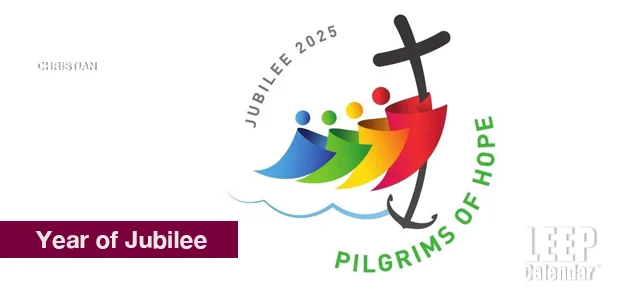 AD
AD
Today is: December 22
Scroll to explore events active on this date.
Additional Events on LEEP
LEEP INK FEATURES

August? Absolutely!
In August, we live through the Dog Days of Summer. It's hot and often humid, and those who can leave for better climates do. Down south, winter is in full force. August is also known as "the ...

In The Heat of July: July 2025 Events
Is it hot enough (or cold enough if you're below the equator) for you yet? There is actually a day for that! Like every month, I pick a diverse collection of events you may or may not know about. This ...

May Blooms: Events in May 2025
Along with October, May is one of the most densely packed months of the year. It's before the summer humidity and the last whole month of the school year. The weather is warming in t...
About 2025, the Year of Jubilee
Family & Friends , Civil Rights
Finance & Banking , Career
Ends: Dec 24, 2025
DESCRIPTION:
Jubilee years reflect the Roman Catholic Church's mercy, forgiveness, and spiritual renewal traditions while representing the continuity of Christian teachings and global unity. The most recent ordinary Jubilee occurred in 2000 under Pope John Paul II. The next four ordinary Years of Jubilee will be 2025, 2050, 2075 and 2100. The website and application for Jubilee 2025 will be active beginning in May 2024.
HEBREW JUBILEE
The concept of the Jubilee year originates in the Old Testament Book of Leviticus (Leviticus 25:8-13). It's an ancient practice with profound social, economic, and spiritual implications. It calls for a year of rest and resets every 50 years following seven cycles of seven years, known as "Shmita."
A Jubilee year encompassed social justice, economic fairness, environmental stewardship, and spiritual renewal. It provided a model for periodic societal reset, ensuring that inequalities did not become entrenched over generations.
For example, consider the Jubilee year tradition of releasing the land. Any land sold or acquired during the previous 49 years returns to its original owners or their heirs, thus ensuring land remained within families and tribes by preventing the permanent accumulation of land by a wealthy elite.
The Jubilee year included traditions like the emancipation of Hebrew slaves. If a Hebrew had sold himself into slavery due to poverty, he or she was released. With rest informing the Jubilee year, even the land lay fallow—absent of being sown or reaped—thus allowing it to rejuvenate.
Jubilee years were proclaimed by "shofar" on the Day of Atonement (Yom Kippur).
CATHOLIC JUBILEE
The concept of a Jubilee in the context of the Roman Catholic Church is a special year of remission of sins and universal pardon, wherein pilgrims come to Rome from around the world to seek spiritual renewal. The tradition dates to 1300 AD when Pope Boniface VIII declared Christianity's first Jubilee year. In 1470 Pope Paul II initiated a Jubilee year every 25, thus ensuring every generation of mankind could experience at least one year of Jubilee within their lifetime.
Occasionally, a Pope will declare an Extraordinary Jubilee outside the ordinary 25-year cycle. An example is the Extraordinary Jubilee of Mercy, called by Pope Francis in 2015 in response to the global migrant crisis.
The Jubilee year typically includes the ceremonial opening of the Holy Doors of the major basilicas in Rome on Christmas Eve, symbolizing an extraordinary pathway to salvation. Pilgrims also receive special indulgences tied to prayers, sacraments, and acts of charity. It ends the following year's Christmas Eve. The Jubilee year has often been an opportunity for the Church to emphasize social justice and humanitarian efforts. Debt forgiveness, aid to the poor, and focus on marginalized communities have often marked these years.
VIDEOS
SUPPORTING DOCUMENTS
Currently, this event does not have supporting documents.
ADDITIONAL IMAGES
Currently, this event does not have supporting images.
Where would you like to go now?
 AD
AD


/footer-logo.svg)
